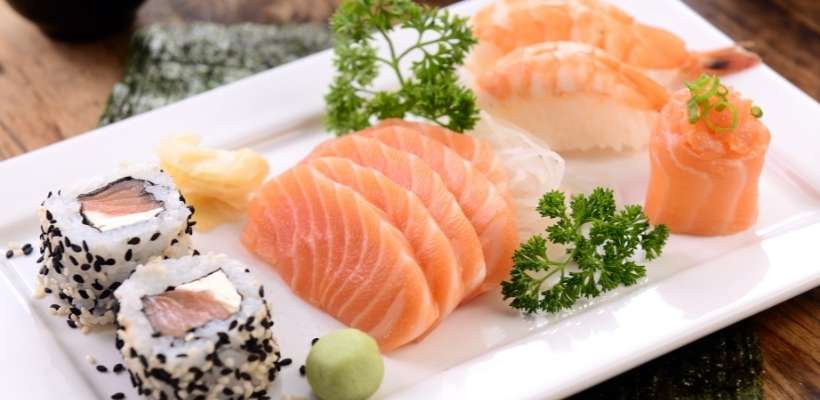Japanese cuisine is known for its variety of flavors and health benefits. Japanese food is low in sugar and calories, making it a healthy choice for those looking to eat healthy. The many vitamins, minerals, and antioxidants found in Japanese foods can help improve your health. Some of the most popular Japanese foods you should try include Seaweed, Rice, Noodles, Soy Foods and Oily Fish. Let’s discuss in this article each of them.
Table of Contents
Seaweed
Edible seaweed is a mainstay of the Japanese diet and is packed with nutrients like iodine, calcium, and vitamin C. Seaweed is also a good source of dietary fiber, which can help to regulate digestion. Some people also believe that seaweed has detoxifying properties. Seaweed is available in many different forms, including sheets, flakes, and powders, so it’s easy to add it to your favorite recipes.
As said earlier it is a good source of iodine, which supports the thyroid gland and helps regulate metabolism. Your thyroid gland needs iodine to make thyroid hormones that are essential for maintaining optimal metabolic function.
Rice
Rice is a staple in Japanese cuisine and is a good source of carbohydrates and thiamin. White rice is a great source of energy for people who are active and need sustained energy throughout the day. This rice is a good source of thiamin, niacin, and vitamin B6. It is also a good source of dietary fiber. White rice is a best choice for people who are trying to lose weight or who have diabetes.
Brown rice is a healthier option that contains more fiber and nutrients than white rice. This type of rice is a whole grain that is high in fiber and nutrients. It has a nutty flavor and a chewy texture. Brown rice is a good source of thiamin, niacin, and vitamin B6. It also has a low glycemic index, which means it does not cause a spike in blood sugar levels. Brown rice is available in both short- and long-grain varieties in Japan. Both types of rice are versatile and can be used in a variety of dishes.
Noodles
Noodles are a popular dish in Japan, and there are many different types to choose from. Buckwheat/Soba noodles and Udon noodles are all low in calories and high in fiber, making them a healthy option for those looking for a quick meal.
- Soba noodles
Soba noodles are a popular type of noodle in Japan. They are made from buckwheat flour and are a healthy food choice. These noodles are high in protein and fiber, and they are low in calories. They also contain important vitamins and minerals, such as iron, magnesium, and zinc. Soba noodles are a good source of antioxidants, which can help protect the body against disease. They have a nutty flavor and a chewy texture. These types of noodles are versatile and can be used in many different dishes.
- Udon noodles
Udon noodles are a type of Japanese healthy wheat noodle. They are usually thick, white, and chewy. They can be served hot or cold, and are often served in soups or with dipping sauces. These noodles are a healthy food choice in Japan because they are low in calories and high in fiber. They also contain important nutrients like protein, iron, and B vitamins. Udon noodles are a popular choice for people who are looking for a healthy, satisfying meal.
Soy Foods
Soybean is not only a major part of the healthy Japanese foods, but it is also a good source of protein, fiber and other nutrients. Soy milk, tofu, and miso soup are just a few of the popular soy-based foods in Japan. Soy milk is a great source of protein and calcium, while tofu is low in fat and cholesterol and high in protein. Miso soup is a nutritious dish that can be enjoyed any time of day. It is made with miso paste, which is a fermented soybean paste, along with vegetables and dashi broth. Soy sauce is another popular soy-based condiment in Japan. It is made from fermented soybeans and wheat and is used to add flavor to dishes.
Oily Fish
Oily fish is a popular, healthy Japanese food. The fish are packed with healthy omega-3 fatty acids, which improve heart health and protect the brain from age-related decline. Additionally, oily fish are a good source of protein and vitamin D. They are low in mercury and other toxins, making them a safe choice for pregnant women and young children in Japan. Oily fish also have a delicious flavor and satisfying texture that many people enjoy.
There are a variety of minced fish products that play a significant role in the Japanese diet for their health benefits. Some of these benefits include aiding in weight loss, improving heart health, and reducing the risk of cancer. The combination of lean protein and omega-3 fatty acids found in fish helps to keep you feeling fuller longer, which can lead to weight loss. Additionally, the omega-3 fatty acids can help to lower cholesterol levels and improve heart health.






